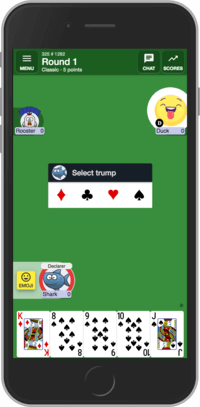Overview
Teen Do Panch is a popular trick taking game in India, Pakistan, and Nepal in which players try to meet and exceed their trick contract. Teen Do Panch is played with 3 players.
Summary
- Each player has a different contract for each round: either 3, 2 or 5 tricks
- Players score 1 point for each trick won above their contract
- Between rounds, players, who score extra points, can steal cards from losing player and return a card of their choosing
Play Multiplayer Teen Do Panch Online
The Deck and the Deal
Teen Do Panch is played with a 30-card deck, containing Aces, Kings, Queens, Jacks, 10s, 9s and 8s, the 7 of Spades and the 7 of Hearts.
There are two rounds of dealing. Five cards are dealt to each player, then the leading player (the player left to the dealer) selects the trump suit for the round. After that, five more cards are dealt to each player, for a hand of 10 cards.
How to Play
For every round, each player has a different contract. The leading player must win at least 5 tricks, the second player 3 tricks and the last player 2 tricks. A player's score for a round is the number of tricks won minus their contract for the round.
At the start of the next round, all roles move clockwise.
Any player who exceeded their contract draws a card at random from a player who failed to make their contract. They then choose a card from their own hand to give in return.
Scoring
Players score 1 point for each trick won above their contract.
Winning
The game ends if at least one player has scored 5 or more points at the end of a round. The winner is the player with the most points. The target can also be set to 3, 8 or 10 points
Alternatively, the game can be set to last a certain number of rounds, and the winner is whoever has the highest score at the end of the game. The options are 3, 5 and 10 rounds.
Variations
CardzMania supports several customizable rules and options so you can play Teen Do Panch exactly how you like or how you grew up playing with your friends and family. In addition to the classic way of playing, we often have new creative options for you to try to spice up the game if you are interested in trying different spins for fun.
Points
Players determine a set amount of points when the game ends.
Rounds
Players determine a set amount of rounds (also known as hands or deals) that the game will go to (instead of the points selection above).
Timer
Players only have a set amount of time to make their turn after which a turn is automatically played for them and the game proceeds: Fast is 7 seconds, Standard is 15 seconds, Slow is 30 seconds, and Very Slow is 60 seconds. Players can also choose to disable the timer, but that is only for private tables.
High Sevens
When enabled, the 7 of spades becomes the highest card followed by 7 of hearts followed by the declared trump cards starting with ace.
Min Suit
When enabled, players must keep two of each suit in hand when choosing cards to pass. This can also be set to 1 or disabled entirely.
Trick Basics
Trick Taking games center around having the highest ranked card in a draw. Typically, players of trick taking games sit in a circle, sometimes in teams and sometimes playing solo, and are dealt a hand of cards. Given the specific game's card ranking (and trump - special suit that beats other suits), players draw a card from their hand in hopes that it outranks the other cards played. The player who outranks the others wins the trick for that round and gameplay is repeated until the cards are exhausted. Typically the player or team with the most tricks wins the game.
In a trick, each player plays a single card. One player is selected to start, then play proceeds clockwise around the table. If possible, players must play a card which is the same suit as the first card played - this is called 'following suit'. If a player cannot follow suit, then they may play any card in their hand. Based on the cards played, one player is declared the winner of the trick, usually for playing the highest value card of the trump suit, or of the suit of the card which started the trick.
After all cards have been dealt, normal trick taking commences. Remember all cards of the suit declared as trump (trump cards) beats any other suit. Whichever team wins seven tricks out of thirteen wins the round, winning all thirteen tricks is referred to as court. If the dealers team achieves this feat, its called a goon court. In single sir, winning the first seven consecutive tricks constitutes a court.
After cards dealt, depending on the trump, you have to figure out your strategy for the game whether to play trump first or not. In single sir / single sar winning the first seven tricks constitutes as a court or a goon court, so the strategy is very different than double sir / double sar. Whichever team (dealers team or trump callers team) wins seven tricks wins the deal and the opposing team becomes the dealer. In double sir, you have to win two consecutive tricks, so the strategy is totally different as you need to keep another high card to win the pile. Note that the second and the second last trick cannot be won, so you have to be extra careful about that too. This game is played in many variations so you have to be extra careful about the rules.
Based on the cards played, one player is declared the winner of the trick, usually for playing the highest value card of the trump suit, or of the suit of the card which started the trick.
Hand
The cards that a player is dealt forms their hand. Each round, a player selects one of the cards in their hand and plays them into the pile. In most trick taking games, all players are dealt the same number of cards and the hand is hidden from the other players, but in some games, like 500, a player can reveal their hand for bonus points.
Pile
The pile is the spot where players place their chosen card for the round. The player with the highest ranked card receives all of the cards in the pile and sets them to the side. In most trick taking games, the individual cards in the pile have a specific point value that is given to the winner.
Dealer
The dealer is chosen at random and passes out the deck of cards to form each player's hand. In most games, the dealer position rotates to the left once the deck needs to be re-shuffled and re-dealt.
Trump
Arguably the most important part of any trick taking game, the trump suit is the highest ranked suit in the game. Every game has its own method of selecting trump. Some games leave the selection up to the winner of the bid while some games make the suit of the lead card the trump suit.
Order
The ranking of the cards is dependent on the game. Ace is usually considered the highest in trick games, but some games from Europe, like Klaverjassen, have the Jack of trump the highest card.
Auction/Bidding
Most trick taking games contain an auctioning/bidding phase at the beginning of gameplay. During this time, players take turns bidding how many tricks they expect to win in the game. The player with the highest bid leads the first trick and decides the trump suit in most games. Often times, if the winner of the bid, sometimes called the declarer, fails to win the amount of tricks they bidded, they receive a lot of penalty points
Lead Card
The Lead card is the first card in the trick. In most trick taking games, subsequent players need to play the suit of the lead card if they can.
Card Game Basics
A deck of cards consists of 52 cards, with 4 distinctive subgroups. Each of these subgroups is recognised by a symbol and are referred to as suits. They consist of Clubs, Spades, Hearts and Diamonds. Each suit contains 13 cards which, generally, are considered in this order, Ace (A), 2, 3, 4, 5, 6, 7, 8, 9, 10, Jacks (J), Queen (Q) and King (K). Some games include the two Jokers found in a standard deck but most games don't.
Feedback
Would like to discuss new features or variations for Teen Do Panch? Need a custom rule? Have a question? Got a suggestion? Don't see a game you want to play? Please contact us by
email, facebook or twitter - we really value your feedback and love hearing from all of you!
This site uses cookies. By continuing to browse the site you are agreeing to our use of cookies.




